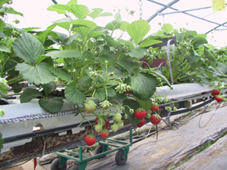Context
Nowadays, as for any crop, the small fruits must comply with the environmental requirements that become more and more strict. They must also guarantee each year a high sanitary and gustatory quality for the consumer. In order to improve the sustainability of the plants quality and therefore that of fruits, producers wish to get concrete answers regarding means of control or eradication of diseases and pests detected within their fields. To answer to these demands, it is important first to know the biology and the behavior of these diseases and pests of cultures in the goal to be able to develop the use of efficient protection strategies All fruits must be healthy and free of all pesticide residues within the legal limit. The systematic use of chemical pesticides is not a solution anymore. If it permits to maintain the plantations in relatively good health conditions by the regular treatments, it generates longer-term problems as the environmental pollution, the resistance development to chemicals, the natural predators disappearance that induced the increase of the pests pressure, … Particularly, the small woody fruit cultures are exposed to many harmful organisms (about ten diseases and about fifteen pests have been counted for the raspberry culture solely). Besides, the number of chemical products currently accepted for these cultures is very limited and agreements are more and more frequently revised. It is therefore primordial to develop more natural and environment friendly protection methodsObjectives
The integrated protection was initiated a few years ago under controlled greenhouse for vegetables culture before being progressively extended to the fruit cultures (pome fruits). The integrated protection in culture of small fruits under greenhouse or in field conditions was not yet studied in Wallonia, excepted for some pests concerning soilless strawberry culture where results of tests were very encouraging.[image] In Wallonia, the small fruit production is for the meantime essentially intended to local sale (sale on farm, side of road, …) and to transformation. The research project that makes the object of the present conventions aims : · to build an experimental and demonstrative center for strawberries and small woody fruits; · to develop techniques of integrated production for small woody fruits according to the identification and the evolution of the pests and natural predators occuring in the cultures; · to characterize varieties of strawberries and small woody fruits well adapted to production and merchandising systems used in Walloon region (varietal and physico-chemical tests); · to improve the plants quality concerning root diseases.Expected results
Varieties characterization, physico-chemical tests and integrated protection trials realized at the CRA-W have to bring to fruit producers (strawberries and small woody fruits) the necessary know-how to manage efficiently these complex cultures.Results obtained
Infrastructures (greenhouses, umbrella shelter, irrigation system, …) and the different cultures of small woody fruits have been installed in the experimental center. Different integrated protection methods concerning various pests are studied. A comparison between the integrated protection and the chemical protection against the spider mite, the thrips and the aphid in strawberry everbearer varieties showed a good efficiency of predators introduced within the integrated tunnel all along the culture. At the opposite, a more and more serious resistance to insecticides and acaricides has been observed in chemically protected tunnel. Several varieties of strawberries (june bearers and everbearers) and of small woody fruits (raspberry, currant, blackcurrant and bramble) showing interesting agronomic features are tested in order to widen the varietal range proposed to producers.Partners
Groupement des Fraisièristes Wallons (GFW asbl)Funding
- DGARNE
- SPW - DG Economy and Employment
Publications
Geerts, P. , Farvacque, S. , Bullen, E. , Magein, H. & Watillon, B. (2014). « La micropropagation des plants de fraisiers en relation avec la productivité au champ – Expertise Wallone (gfw-craw). ». Agronomiquemenr vôtre, Gembloux, 13 et 14 juin.
Farvacque, S. (2013). Nouvelle fin de saison des fruits annonciateurs de beau temps. CRA-W info, n° 40, p. 1.



